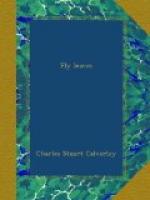DISASTER.
’Twas ever thus from childhood’s hour!
My fondest hopes would not decay:
I never loved a tree or flower
Which was the first to fade away!
The garden, where I used to delve
Short-frock’d, still yields
me pinks in plenty:
The peartree that I climb’d at twelve
I see still blossoming, at twenty.
I never nursed a dear gazelle;
But I was given a parroquet —
(How I did nurse him if unwell!)
He’s imbecile, but lingers
yet.
He’s green, with an enchanting tuft;
He melts me with his small black
eye:
He’d look inimitable stuff’d,
And knows it—but he will
not die!
I had a kitten—I was rich
In pets—but all too soon
my kitten
Became a full-sized cat, by which
I’ve more than once been scratch’d
and bitten.
And when for sleep her limbs she curl’d
One day beside her untouch’d
plateful,
And glided calmly from the world,
I freely own that I was grateful.
And then I bought a dog—a queen!
Ah Tiny, dear departing pug!
She lives, but she is past sixteen
And scarce can crawl across the
rug.
I loved her beautiful and kind;
Delighted in her pert Bow-wow:
But now she snaps if you don’t mind;
’Twere lunacy to love her
now.
I used to think, should e’er mishap
Betide my crumple visaged Ti,
In shape of prowling thief, or trap,
Or coarse bull-terrier—I
should die.
But ah! disasters have their use;
And life might e’en be too
sunshiny:
Nor would I make myself a goose,
If some big dog should swallow Tiny.
CONTENTMENT. AFTER THE MANNER OF HORACE.
Friend, there be they on whom mishap
Or never or so rarely comes,
That, when they think thereof, they snap
Derisive thumbs:
And there be they who lightly lose
Their all, yet feel no aching void;
Should aught annoy them, they refuse
To be annoy’d:
And fain would I be e’en as these!
Life is with such all beer and skittles;
They are not difficult to please
About their victuals:
The trout, the grouse, the early pea,
By such, if there, are freely taken;
If not, they munch with equal glee
Their bit of bacon:
And when they wax a little gay
And chaff the public after luncheon,
If they’re confronted with a stray
Policeman’s
truncheon,
They gaze thereat with outstretch’d necks,
And laughter which no threats can
smother,
And tell the horror-stricken X
That he’s
another.
In snowtime if they cross a spot
Where unsuspected boys have slid,
They fall not down—though they would not
Mind if they did:
When the spring rosebud which they wear
Breaks short and tumbles from its
stem,
No thought of being angry e’er
Dawns upon them;




